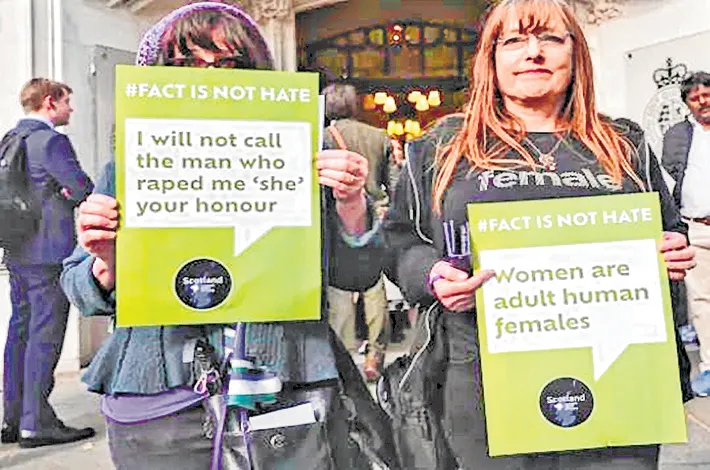‘Woman’ refers to biological sex: SC
17-04-2025 12:00:00 AM

RULING ON EQUALITIES LAW IN UK | This means a transgender with a certificate that recognizes the person as ‘female’ should not be considered a woman for equality purposes
Agencies LONDON
The British Supreme Court ruled Wednesday that the definition of a woman under equality legislation referred to "biological sex". Justice Patrick Hodge said five judges at the court had ruled unanimously that "the terms woman and sex' in the Equality Act refer to a biological woman and biological sex".
The ruling means that a transgender person with a certificate that recognizes them as female should not be considered a woman for equality purposes. But the court added that its ruling "does not remove protection from trans people," who are "protected from discrimination on the ground of gender reassignment".
‘The Equality Act 2010 gives transgender people protection, not only against discrimination through the protected characteristic of gender reassignment, but also against direct discrimination, indirect discrimination and harassment in substance in their acquired gender,’ Lord Hodge said.
The ruling adds that a trans woman can claim sex discrimination because they are perceived to be a woman. The case stems from a 2018 law passed by the Scottish Parliament stating that there should be a 50% female representation on the boards of Scottish public bodies. That law included transgender women in its definition of women.
For Women Scotland (FWS), a women's rights group, had challenged that law, arguing that its redefinition of woman went beyond parliament's powers. But Scottish officials then issued new guidance stating that the definition of woman included someone with a gender recognition certificate (GRC), a document that shows a person’s affirmed gender is legally recognised.
FWS successfully sought to overturn that.
The group had said the outcome of the case could have consequences in Scotland, England and Wales for sex-based rights as well as single-sex facilities such as toilets, hospital wards and prisons.
The challenge was rejected by a court in 2022, but the group was granted permission last year to take its case to the Supreme Court.
The women's right group counted among its supporters author J.K. Rowling, who reportedly donated tens of thousands of pounds to back its work.
Opponents, including Amnesty International, said excluding transgender people from sex discrimination protections conflicted with human rights laws.
Amnesty submitted a brief in court saying it was concerned about the deterioration of the rights for trans people in the UK and abroad.
"A blanket policy of barring trans women from single-sex services is not a proportionate means to achieve a legitimate aim," the human rights group said.








